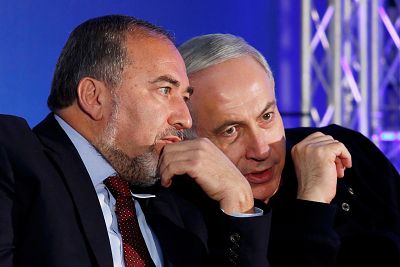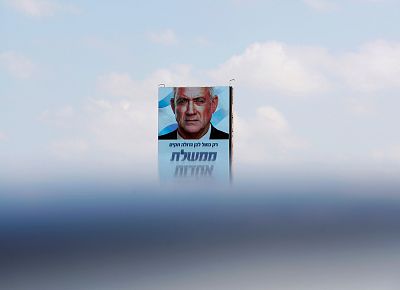The former defense minister has tapped into a wellspring of resentment of the ultra-Orthodox, attracting a new base of voters.
TEL AVIV — Benjamin Netanyahu's future may lie in the hands of a former nightclub bouncer who began his political career as the prime minister's aide.
Avigdor Lieberman — a former defense and foreign minister — was until this election cycle best known for his hard-line stance against Israeli Arabs.
His nationalist Yisrael Beitenu party has pushed for the death penalty for terrorists and a loyalty oath for Arab citizens, who represent 20 percent of Israel's population. Lieberman's controversial statements include suggesting that Arab members of the Knesset, Israel's Parliament, are collaborators who should be executed, and that "disloyal" Israeli Arabs should be beheaded.
Yet over the last six months, Lieberman has undergone a political makeover, turning his focus from security to religious freedom. In the process, he has become an unlikely torchbearer for secular Israelis as well as the likely kingmaker in Israel's Sept. 17 election. Now his slogan is, "Make Israel Normal Again."
It won't be the first time he has held the keys to power. It was because of Lieberman's opposition to the influence of religious parties that Netanyahu failed to establish a government after the elections in April. The do-over election this month is a first in Israeli history.
It was also Lieberman's resignation as defense minister in November, citing the prime minister's approach to militants in the Gaza Strip, that led to the fall of Netanyahu's last government,
Lieberman is now pushing for a unity government between Netanyahu's Likud party and its leading opponent, the center-left Blue and White. His stated goal is to prevent a government dominated by ultra-Orthodox religious parties, as Netanyahu's previous coalitions have been.
Netanyahu made headlines earlier this week by pledging to annex parts of the West Bank. Lieberman reacted on Twitter by calling the prime minister's speech "a dramatic statement", adding two laughing emojis.
What is so game-changing about Lieberman's role in this election is that he is attracting voters from both the right and the center-left, according to Gayil Talshir, a political science professor at Jerusalem's Hebrew University.
"Once Lieberman changed the agenda from security to religion-state issues, many voters crossed the right-left divide in both directions," she said.
Lieberman has accomplished this by tapping into growing resentment toward the power of ultra-Orthodox parties in the Israeli government. His campaign is laser-focused on secular Israelis, who feel their lives are being controlled by a small but powerful minority.
"I have nothing against ultra-Orthodox Jews, only their leadership," said Inna Rozman, who works in the tech sector and plans to vote for Yisrael Beitenu.
"I don't want to wake up one morning on Shabbat and lose my car because it's suddenly illegal to drive," she added.
Rozman, 36, lives in Ashdod, where protests erupted last year over efforts to close businesses on the Jewish Sabbath. Though her children attend secular schools, Rozman feels they are receiving religious indoctrination that didn't exist when she grew up here.
Indeed, Israel's education ministry has reportedly authorized the increasingly religious teaching in secular schools. Another example of this perceived religious coercion is a new government campaign urging Jewish women to take ritual baths.
'We're not asking for much'
Lieberman's campaign speaks directly to voters like Rozman.
"Yes to a Jewish state, no to a halachic state," his ads declare, referring to biblical Jewish law, which some lawmakers wish to bring back.
Lieberman's campaign video, "We're not asking for much," echoes secular Israelis' desire for ultra-Orthodox men to serve in the army and go to work. Ultra-Orthodox students are exempt from the Israeli military service that is mandatory for all Jewish Israelis when they turn 18.
News
The ultra-Orthodox, who make up around 10 percent of Israel's population, have high rates of unemployment and poverty, coupled with a high birthrate that leaves many relying on welfare.
"These state-religion issues are really striking a cord with a much larger part of the electorate than just Lieberman's loyal voters," Talshir said.
"The fact that a right-winger is fighting for the character of Israel as a secular state against the creeping religionization of the public sphere is a game changer."
An August poll by the Israel Democracy Institute found that 69 percent of Jewish citizens believe that young ultra-Orthodox men should serve in the military, and 60 percent support public transportation on Shabbat. Civil marriage, nonexistent in Israel, is supported by 60 percent of the Jewish public.
Many of his supporters, like Lieberman himself, emigrated from the former Soviet Union and represent 15 percent of Israel's population. Resentment of the ultra-Orthodox influence over Israeli society, and marriage in particular, runs deep in this group. According to the nonprofit organization Hiddush, approximately 350,000 immigrants from the former Soviet Union cannot legally marry in Israel because rabbinic authorities don't accept them as Jewish. Many are forced to marry abroad.
Yaakov Shklar, a lawyer in Tel Aviv who was born in Belarus, has usually voted for center-left parties, but plans to vote for Yisrael Beitenu in September because he wants a secular state.
"Why can't I get married in Israel and need to get married in Cyprus?" asked Shklar, 53. "Why is my son serving in the army and they're not? Why do I need to fund these parasites? And why can't I go shopping on Shabbat because of them? This is the religious extortion that Lieberman is fighting against."
Polls predict a repeat of April's vote
Facing an impending indictment on charges of corruption, Netanyahu — Israel's longest-serving prime minister — is fighting for his political survival and needs every right wing vote he can get. He's now campaigning directly to Lieberman's base, meeting with Russian-speaking voters and traveling to Ukraine for a state visit.
Under Israel's parliamentary system, voters cast their ballots for a party, not a person. The leader of the party with the most votes, who is able to form a governing coalition of a majority of the 120 Knesset members, becomes prime minister.
In the April elections, Netanyahu's Likud party and its chief rival, the center-left Blue and White, both won 35 seats, but Netanyahu's right-wing bloc had more votes. Though Lieberman's party secured just five seats, Netanyahu needed his support to form a coalition.
Polls and analysts predict a potential repeat of the April election results. If that happens, neither side would be able to form a government without Yisrael Beitenu, which means Lieberman could once again be the kingmaker. Since April, polls have shown his party jumping from five seats to 10 or 11 this month.
When it comes time for coalition building, Lieberman will have even more leverage this time around, but he's upped his demands. In addition to public transportation on Shabbat, civil marriage and military service for the ultra-Orthodox, Lieberman's call for a unity government would keep the ultra-Orthodox parties out.
That has attracted voters from across the spectrum who want to see an end to Netanyahu's decade-long rule. Blue and White has vowed not to sit in a government with a prime minister facing indictment, so a unity government may only be possible without Netanyahu.
Netanyahu, however, has refused to step down and forced Likud party members to sign a loyalty oath vowing that only he will lead the party regardless of election results. He was mocked by Lieberman and other critics as making Israel look like North Korea.
"What's at stake in this election isn't just the personal destiny of Netanyahu but what's happening to Israeli democracy," said Talshir, echoing the sentiments of 70 percent of Israelis who believe the nation's democracy is in danger, according to the latest Israeli Democracy Index.
"This is what the elections are really about," she adds. "The future of Israel as both Jewish and democratic."














